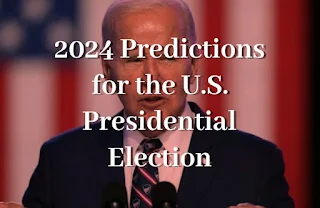2024 Predictions for the U.S. Presidential Election
As the United States gears up for another presidential election in 2024, speculation and anticipation are already mounting regarding the potential outcomes. With the political landscape continually evolving, several key factors will likely influence the race for the White House. Here's a look at some predictions for the 2024 U.S. presidential election
Incumbent Advantage or Disadvantage
If an incumbent president is running for re-election, their performance during their first term will heavily impact their chances. Approval ratings, economic indicators, and overall public sentiment will play crucial roles in determining whether the incumbent has an advantage or faces an uphill battle.
Political Climate
The political climate at the time of the election will shape voter attitudes and behavior. Factors such as major policy debates, social movements, and international events can sway public opinion and influence electoral outcomes.
Party Dynamics
The state of the two major political parties, the Democrats and the Republicans, will also influence the election. Internal party divisions, ideological shifts, and leadership dynamics will impact candidate selection and party unity, which, in turn, could affect voter turnout and support.
Demographic Trends
Changing demographic trends, including shifts in population distribution, generational dynamics, and ethnic composition, will have implications for electoral strategies and coalition-building efforts by both parties.
Candidate Profiles
The personalities, backgrounds, and policy platforms of the presidential candidates will be pivotal in shaping voter preferences. Factors such as charisma, experience, authenticity, and perceived competence will all come into play as voters assess their choices.
Campaign Strategies
The effectiveness of campaign strategies, including messaging, fundraising, mobilization efforts, and media outreach, will determine the candidates' ability to connect with voters and garner support across key battleground states.
Electoral College Dynamics
The Electoral College system will continue to be a critical factor in determining the outcome of the election. Candidates will focus on winning the requisite number of electoral votes rather than simply winning the national popular vote.
External Influences
External factors, such as technological advancements, foreign interference, and unforeseen events like natural disasters or security crises, could disrupt the election process and shape its outcome in unforeseen ways.
Voter Turnout
Voter turnout, particularly among key demographic groups, will be a crucial determinant of electoral outcomes. Efforts to mobilize and engage voters, including voter registration drives and get-out-the-vote initiatives, will be instrumental in shaping the electorate.
Swing States and Margins of Victory
The battle for swing states and the margins of victory in closely contested regions will ultimately decide the winner of the election. Candidates will focus their resources and campaign efforts on states where the race is expected to be tight.
The 2024 U.S. presidential election is likely to be a closely watched and fiercely contested contest, with multiple variables and uncertainties at play. While predictions can provide insights into potential outcomes, the ultimate result will hinge on a complex interplay of factors that will unfold in the months leading up to Election Day.









0 Comments